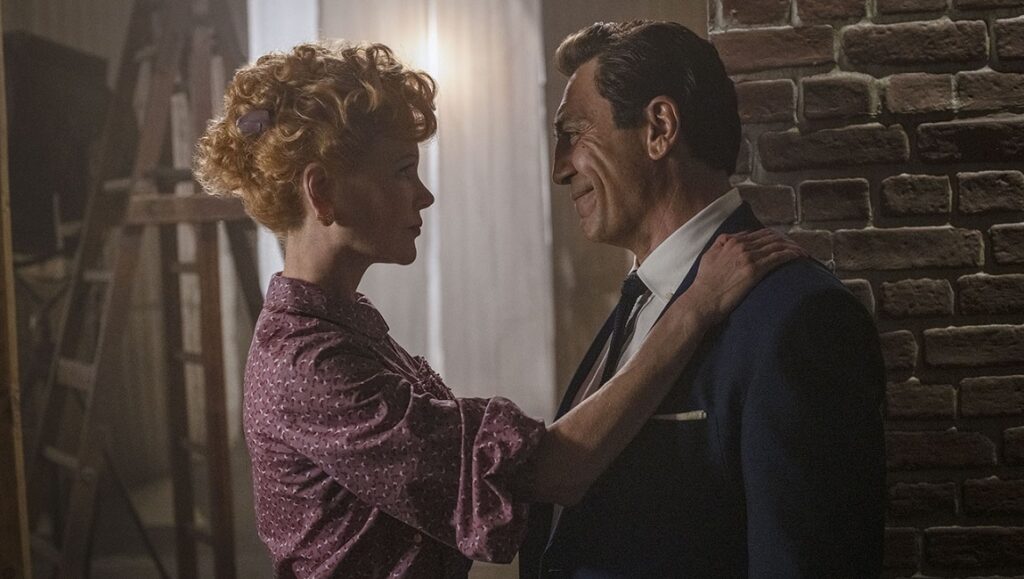Being the Ricardos would have benefitted from more fully committing to one of its many directions, but it remains a slick, emotionally dynamic film and further proof of Sorkin’s evolving facility with feature-length drama.
If one were to make an Aaron Sorkin mood board, chances are that most things on that board would correlate in some way with the true-life Hollywood story of Lucille Ball, Desi Arnaz, and the couples’ long-running CBS sitcom, I Love Lucy. You’d be forgiven for guffawing at that sentiment: Sorkin, after all, really broke through as a writer with his own distinct voice when he helmed turn-of-the-century White House drama The West Wing, while a younger generation probably knows him best as the scribe behind a pair of Silicon Valley origin stories, David Fincher’s The Social Network and Danny Boyle’s Steve Jobs. Regardless of the epoch in discussion, Sorkin’s identifiers as an artist tend to skew self-serious, self-important, and male.
So why is Sorkin so well-suited for a film about a sitcom? Well, for one thing, the “about” in that sentence is very important: Being the Ricardos affords Sorkin the opportunity to write scenes in some of his favorite spaces (writers rooms, offices, sets), as he follows Ball (Nicole Kidman) and Arnaz (Javier Bardem) over the course of one week of production on their show, through table reads on Monday, to contentious rehearsals mid-week, to Friday night’s taping before a live studio audience. And as Sorkin established with a trio of his defunct TV series (Sports Night, Studio 60 on the Sunset Strip, and, most recently, The Newsroom), immersing us in the behind-the-scenes machinations of TV production is something that is very much in his wheelhouse. In fact, Sorkin repeatedly finds ways of throwing us off the scent of an otherwise straightforward biopic by indulging in heated debates about line readings and stage direction.
But even more so than his meta TV show trilogy, the best barometer for Being the Ricardos is probably Sorkin’s directorial debut, 2017’s Molly’s Game. That film continued down a path that the latter half of Sorkin’s screenplay for Steve Jobs, from two years earlier, seemed to be road-testing: How earnest could the drama get without losing the signature dry and cynical wit of Sorkin’s most celebrated writing credits. In Molly’s Game, Sorkin found source material largely unburdened of the high cultural awareness that came with his biopics on Jobs and Mark Zuckerberg, and as well from the hyper-scrutiny of sports lore that sometimes seemed to dog his script for Steve Zallion’s Moneyball. Instead, we got Russian mobsters, the FBI, high-stakes poker, and, most importantly, an emotionally complex and professionally adroit heroine.
Being the Ricardos not only marks the second time that Sorkin has willfully and purposefully let an actress on screen run the table on all her male counterparts, but it also embraces a level of comic and melodramatic flamboyance that goes some way toward deflating that self-seriousness telegraphed by Sorkin’s particular brand of intense, rapid-fire dialogue. In short, Sorkin embraces how funny everyone sounds with his words in their mouths, and has great fun — more so even than he did with the flashy genre elements in Molly’s Game — allowing a cast of skilled actors (J.K. Simmons, Tony Hale, but especially Kidman and Alia Shawkat) to play a think tank of ’60s comedy television professionals engaging in games of one-upmanship.
Where Being the Ricardos might lose people, then, is in its more earnest moments — just as Molly’s Game takes a heartstring-tugging turn when Kevin Coster’s character shows up. Packed into the typically dense, two-hour sprawl of this Sorkin script are a pair of dramatic plots about Ball’s brush with the Unamerican Activities Committee and her suspicion of Arnaz’s cheating, along with ample, multi-generational commentary on the changing attitudes toward women’s agency that I Love Lucy tried to navigate. It’s a quietly ambitious movie that, thanks to Sorkin’s ever improving facility with structuring feature-length drama, tends to feel modest, and that might have commanded more respect had it gone further in any one of its many directions. But that’s its appeal, too: Sorkin’s crafted a slick, sharply written, emotionally dynamic film that allows him to both write on his favorite themes and to do so in a way that validates his flamboyant style like few subjects could. And in the process, he’s made an appropriately scaled tribute to Lucille Ball’s pragmatic, shrewd, and consummate professionalism.
You can watch Aaron Sorkin’s Being the Ricardos in theaters beginning on December 10 or streaming on Amazon Prime Video beginning on December 21.


Comments are closed.